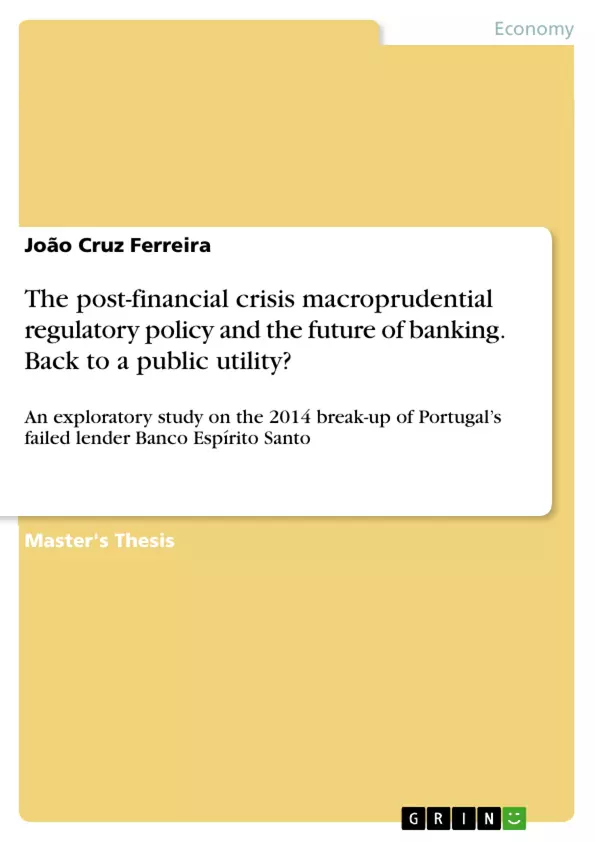The concept of “banking as a public utility” only makes sense when contemplating the traditional commercial and retail banking services for the public, such as operating deposit accounts, executing payment services or providing loans. In the early stages of banking, when interest charged on loans and deposits was merely symbolic - largely due to the religious restrictions on usury -, banking practices were seen as serving a low-return public utility.
In this research paper, I addressed the question of whether large banks, forced to reduce leverage and strengthen liquidity in light of rigorous capital adequacy requirements, will restrict their business in the near future by getting rid of non-core activities, only to permanently turn to low-risk and limited profitability basic banking activities, serving a public role similar to that of public utilities such as gas, water or electric companies.
Inhaltsverzeichnis (Table of Contents)
- A BANKING UTILITY
- HISTORY OF BANKING
- BANKING REGULATION
- MACROPRUDENTIAL TOOLS & CAPITAL ADEQUACY.
- THE GLOBAL FINANCIAL CRISIS
- REGULATORY RESPONSES
- BIS, Basel Committee and the Accords
- Basel III
- BANCO ESPÍRITO SANTO
- NOVO BANCO
- "BEFORE AND AFTER"
- BACK TO THE DRAWING BOARD?
Zielsetzung und Themenschwerpunkte (Objectives and Key Themes)
This research paper aims to critically evaluate the impact of increasingly stringent prudential regulation on the banking sector, specifically focusing on the concept of "banking as a public utility." The paper explores whether large banks, facing stricter capital adequacy requirements, will transition towards a more limited, low-risk banking model, akin to public utilities.
- The impact of post-financial crisis macroprudential regulation on banking.
- The concept of "banking as a public utility" and its implications for the industry.
- The role of Basel III and its influence on banking practices.
- A case study analysis of Banco Espírito Santo and Novo Banco, highlighting the impact of regulatory changes on their business models.
- Potential future scenarios for the banking sector, including the potential for a Glass-Steagall-like separation of commercial and investment banking.
Zusammenfassung der Kapitel (Chapter Summaries)
- A BANKING UTILITY: This chapter introduces the concept of "banking as a public utility" and its historical context, exploring the evolution of banking practices from early forms of lending to modern-day universal banking.
- HISTORY OF BANKING: This chapter provides a comprehensive overview of the history of banking, tracing its origins from ancient civilizations to the development of modern banking institutions and the emergence of central banks.
- BANKING REGULATION: This chapter delves into the complexities of banking regulation, analyzing the role of government intervention in the financial market, exploring the rationale for regulation, and examining the potential drawbacks of excessive regulation.
- MACROPRUDENTIAL TOOLS & CAPITAL ADEQUACY.: This chapter focuses on macroprudential tools and capital adequacy requirements, discussing the evolution of regulatory frameworks in response to financial crises and examining the impact of these tools on banking practices.
- THE GLOBAL FINANCIAL CRISIS: This chapter analyzes the causes and consequences of the 2007-2008 global financial crisis, highlighting the systemic risks associated with unregulated financial markets and the need for robust regulatory mechanisms.
- REGULATORY RESPONSES: This chapter examines the regulatory responses to the global financial crisis, including the development of Basel III and its implications for banking institutions.
- BIS, Basel Committee and the Accords: This chapter provides an overview of the Basel Committee on Banking Supervision (BCBS) and its role in developing international banking regulations, including the Basel Accords.
- Basel III: This chapter delves into the specific provisions of Basel III, examining its key elements such as capital requirements, liquidity ratios, and stress testing.
- BANCO ESPÍRITO SANTO: This chapter provides a case study of Banco Espírito Santo, a Portuguese banking group that went bankrupt in 2014, examining its business model and its vulnerabilities in the face of regulatory changes.
- NOVO BANCO: This chapter presents the case study of Novo Banco, a "good bank" created from the ruins of Banco Espírito Santo, exploring its deleveraged business model and its focus on core banking activities.
- "BEFORE AND AFTER": This chapter compares and contrasts the business models of Banco Espírito Santo and Novo Banco, highlighting the impact of regulatory changes on their respective operations.
Schlüsselwörter (Keywords)
This research paper explores key topics in the field of banking regulation, including macroprudential policy, capital adequacy, Basel III, financial stability, banking as a public utility, and the impact of regulatory changes on the business models of large banks. The case study of Banco Espírito Santo and Novo Banco provides a practical example of the interplay between regulatory frameworks and banking practices.
Frequently Asked Questions
What does "banking as a public utility" mean?
It refers to the idea that banks should focus on basic, low-risk services like deposits and loans, similar to essential services like water or electricity providers.
How did the global financial crisis change banking regulation?
The crisis led to stricter macroprudential tools and higher capital adequacy requirements, forcing banks to reduce leverage and strengthen liquidity.
What is the significance of Basel III?
Basel III is a global regulatory framework that introduced higher capital requirements and new liquidity ratios to prevent future systemic financial collapses.
What can we learn from the Banco Espírito Santo case?
The bankruptcy of BES and the creation of Novo Banco illustrate the shift from risky universal banking models toward deleveraged, core banking activities.
Will banks become less profitable due to new regulations?
Stricter regulations often lead to limited profitability as banks move away from high-risk non-core activities to fulfill their role as stable financial utilities.
- Citar trabajo
- João Cruz Ferreira (Autor), 2016, The post-financial crisis macroprudential regulatory policy and the future of banking. Back to a public utility?, Múnich, GRIN Verlag, https://www.grin.com/document/344962



